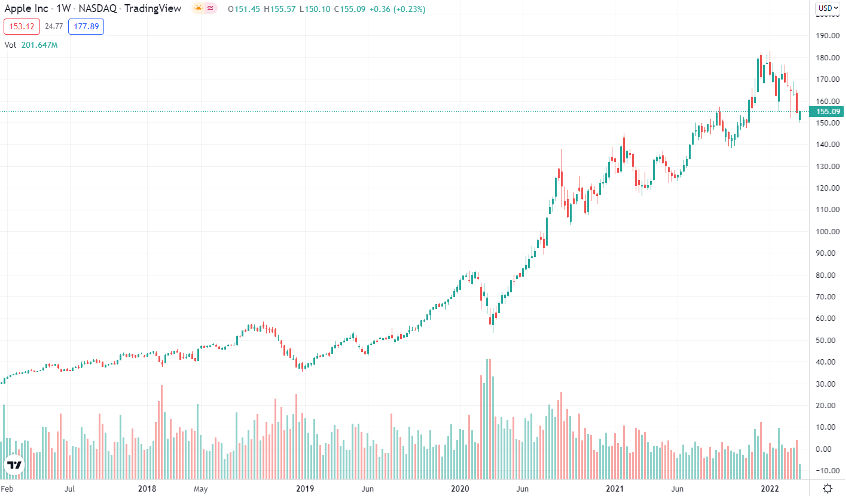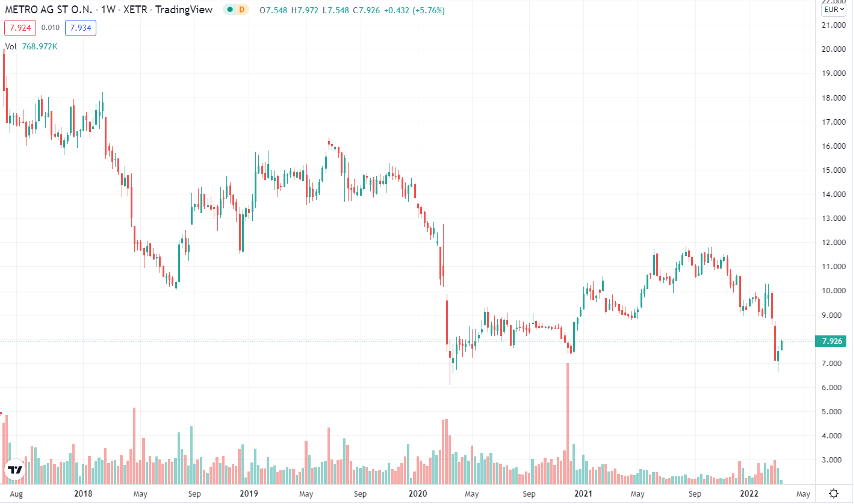The corporate exodus begins
In total, more than 330 global companies[1] and brands have already suspended their business in Russia. The list is growing every day, not only to express solidarity with Ukraine, but because of the sanctions applied by Western countries against Russia. These are restricting (also as a result of the fall in the value of the rouble to record lows) the ability of companies operating there to make payments or trade not only in the local market but also with the West. Since the companies that have announced their departure include major companies of international importance, there can be no doubt that this situation will mean the loss of tens and possibly hundreds of thousands of jobs in Russia.
Apple is leaving and Volkswagen is suspending its activities
The tech giant has suspended the sale of all its products in Russia, including the operation of the Apple Pay payment service. Russian residents will no longer be able to buy a new iPhone or MacBook. Car manufacturer Volkswagen has announced that it is stopping production of vehicles until further notice, affecting its manufacturing facilities in Kaluga and Nizhny Novgorod. The export of cars to Russia has also been stopped with immediate effect.[2] As a result of the negative investor sentiment due to the war, Apple's stock has been losing value in recent weeks. But they have gained 25 percent over the past year.[3]

Apple Inc. Performance for the last 5 years. Source: tradingwiev.com
IKEA closes all stores
Representatives of the IKEA brand said that the "enormous impact on human lives" of the military invasion had forced them not only to close all stores in Russia, but also to suspend production on Russian territory.[4] The Swedish retail giant has thus temporarily suspended all production in Russia and Belarus. This decision immediately caused an onslaught of local consumers on shopping malls, who in the last days tried to buy their products. A total of 17 stores and around 15,000 employees will be affected by the restriction on the sale of IKEA products.[5]
Some companies have only partially reduced their operations
The extent to which companies have distanced themselves from a country that has created unrest in the world varies. Some have suspended only part of their business with Russia or will not engage in any new business or investment. An example is the multinational tobacco manufacturer Philip Morris International. Nestlé, the world's largest packaged food group, in turn plans to continue its operations at least by providing basic needs and thus helping to maintain the "continuity" of food supplies from Russia.[6]
MAKRO stores will remain open
Metro AG said a few days ago that it has no plans to pull out of Russia and employees are working to keep its stores open.[7] The Düsseldorf-based company said it has 93 stores in Russia, employing about 10,000 people. In addition, its departure would also directly affect 2.5 million small and medium-sized businesses. Metro said it has a responsibility to its employees and partners, none of whom bear personal responsibility for the war in Ukraine. However, these decisions by the company may have a negative impact on the company's stock in the current mood of investors.[a] Over the past year, the company's stock market value has declined by 17 percent.[8]

Metro Ag's performance since its listing. Source: tradingwiev.com
Banks are leaving too
Following the criticism from investors and politicians, Germany's Deutsche Bank, which until then had argued that it had to support its clients there, announced that it is withdrawing from the Russian market. According to Oleh Ustenko, an economic adviser to the Ukrainian government, the Russian invasion of Ukraine has so far caused at least $100 billion worth of damage to infrastructure, buildings and other physical assets.
* Past performance is no guarantee of future results
[a] Forward-looking statements are based on assumptions and current expectations, which may be inaccurate, or on the current economic environment, which may change. Such statements are not guarantees of future performance. They involve risks and other uncertainties that are difficult to predict. Results may differ materially from those expressed or implied by any forward-looking statements.
[1] https://www.investopedia.com/nearly-330-companies-have-withdrawn-from-russia-5221814
[2] https://www.volkswagenag.com/en/news/2022/03/volkswagen-stops-production-of-vehicles-in-russia-and-suspends-e.html
[3] https://www.investing.com/equities/apple-computer-inc
[4] https://www.theguardian.com/business/2022/mar/03/ikea-closes-all-stores-and-factories-in-russia-amid-exodus-of-western-firms
[5] https://www.rte.ie/news/business/2022/0303/1284168-ikea-on-russian-operations/
[6] https://www.reuters.com/business/exodus-draws-russian-threat-nationalise-foreign-plants-2022-03-09/
[7]https://tass.com/economy/1420077?utmsource=google.com&utmmedium=organic&utmcampaign=google.com&utmreferrer=google.com